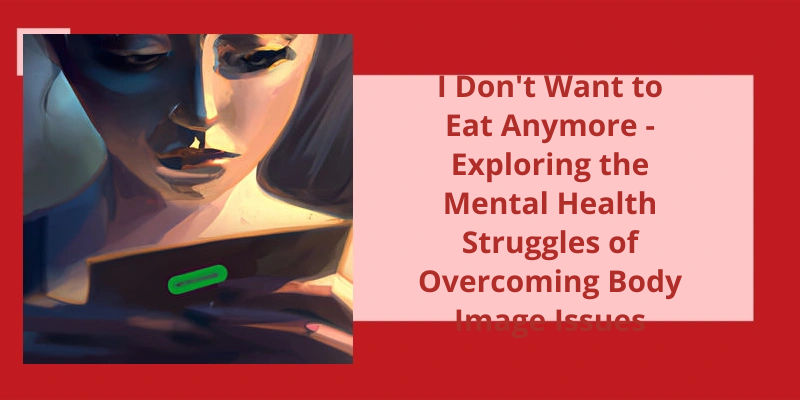Will I Get Skinnier if I Stop Eating for a Week?
When you’re looking to lose weight, there are plenty of diets or fads that you might come across. One of the more extreme methods is going without food for a week. While this may lead to a reduction in weight, it isn’t a healthy or sustainable way to lose weight.
There are several issues with going without food for a prolonged period of time. You might feel like you’re losing weight quickly, but this is because your body is consuming muscle and fat as a source of energy. This can have a negative impact on your health, especially if you’re already underweight or have an underlying medical condition.
Starvation can cause increased anxiety, depression, and has even been linked to suicide. You might become irritable and suffer from a lack of concentration, making it difficult for you to function in your daily life.
Furthermore, when you deprive your body of nutrients, your metabolism will slow down to conserve energy. This makes it even more challenging to lose weight in the long run, as your body will store more fat and burn fewer calories. Your body might even begin to break down healthy cells, further damaging your health and making it harder to lose weight.
Ultimately, the best way to lose weight is through a balanced diet and exercise regime. You can also seek out the advice of a medical professional or registered dietician to get a personalized plan that works for your body and lifestyle. Remember, the key to healthy weight loss is patience, consistency, and a focus on overall health and wellness.
When it comes to mindless snacking and binging on unhealthy foods, it can be difficult to break the habit. However, there are strategies you can implement to help you overcome this urge. Rather than succumbing to the craving, try to occupy your mind with alternative activities. Taking a brisk walk, reading, or chatting with a friend are just a few examples of how you can distract yourself from mindless snacking. Additionally, removing tempting comfort foods from your home can help mitigate the temptation to indulge.
How Do I Stop Eating Food I Don’t Want To?
It can be challenging to stop eating food that you don’t want to. When you’re feeling bored, stressed, or anxious, it can be tempting to reach for a snack or treat. However, there are ways to break this habit and create healthier patterns. One approach is to distract yourself with other activities that are more nourishing for your body and mind.
For example, taking a walk is an excellent way to clear your head and get some fresh air. Exercise has been shown to boost mood and reduce stress levels, which can help to prevent overeating. Alternatively, watching a movie or listening to music can help to shift your focus away from food cravings and onto something enjoyable and engaging.
It can also be helpful to keep healthy snacks on hand, such as fresh fruit, vegetables, or nuts. When you feel the urge to snack, reach for one of these options instead of something high in sugar or fat. If you do keep snacks in your home, try to choose items that are easy to portion control.
Another approach is to practice mindful eating. This means tuning in to your bodys hunger and fullness cues and eating only when you’re truly hungry. It can be helpful to eat slowly and savor each bite, rather than rushing through a meal or snack.
Finally, it’s essential to be kind to yourself and remember that healthy habits take time to develop. If you slip up and indulge in something you didnt plan on eating, don’t beat yourself up. Instead, focus on getting back on track and making healthy choices in the future. With a little patience and perseverance, you can break free of unhealthy eating habits and create a more nourishing relationship with food.
If you’re feeling hungry but don’t want to eat, there are options to help you address your hunger while also taking care of your body. Rather than forcing yourself to eat a full meal, you can opt for smaller, more frequent meals to ease into eating again. Choosing easy-to-digest foods and incorporating liquid nutrition can also help with appetite suppression without sacrificing proper nutrition. Staying hydrated and engaging in light physical activity can also make a big difference in balancing hunger levels.
What to Do if You’re Hungry and You Don’t Want to Eat?
It’s not uncommon to experience hunger pangs even when you don’t feel like eating a full meal. The thought of food may not appeal to you, but there are other ways to satisfy your hunger. One strategy is to eat small, frequent meals throughout the day. This can help stabilize your blood sugar levels and prevent large drops that often lead to intense hunger.
If you don’t feel like eating, it may be helpful to choose easy-to-digest foods that are nutrient-dense. This could include homemade soups, smoothies, or even a simple piece of fruit. These types of foods are gentle on the digestive system, making them easier to eat and digest. It may also be helpful to avoid spicy or heavily seasoned foods that could exacerbate any digestive discomfort.
Another option to consider is liquid nutrition. Instead of eating solid food, you may benefit from drinking nutrient-rich beverages like bone broth, herbal tea, or vegetable juice. These drinks can help provide vital nutrients without causing bloating or indigestion. Liquid nutrition is an excellent way to stay hydrated and nourished, even if you don’t feel like eating.
Speaking of hydration, it’s important to drink plenty of water when youre not eating. Dehydration can mimic feelings of hunger, so it’s critical to stay hydrated throughout the day. Aim for at least eight glasses of water every day, and adjust your intake based on your activity level, age, and overall health. Drinking water can also help flush toxins from the body and promote healthy digestion.
Lastly, light physical activity, such as gentle yoga, stretching, or walking, could also help ease any feelings of hunger. Exercise helps stimulate the digestive system, improve circulation, and release feel-good endorphins that could help boost your mood. Even if you don’t feel like doing anything too strenuous, moving your body in a gentle way could help alleviate any discomfort associated with hunger.
Source: I’m really hungry, but have no food at the moment. What …
As we all know, eating is necessary to sustain life and maintain good health. However, sometimes we find ourselves eating more than we intended or binging on unhealthy foods. While occasional overeating may not necessarily be a cause for concern, if it’s a pattern that interferes with your daily life, it may be a sign of binge eating disorder. It can be a difficult and emotional experience to struggle with this disorder, but there’s help and support available for those who need it.
Why Can’t I Stop Eating Even Though I Don’t Want To?
If you find yourself unable to control your desire to eat, even if you don’t feel hungry, it may be an indication of binge eating disorder. It’s a serious condition that can lead to obesity, high blood pressure, heart disease, and other life-threatening medical conditions. Individuals who suffer from binge eating disorder find themselves consuming large amounts of food within a short time frame, often until they feel uncomfortably full.
Recognizing this disorder can be a challenge, but if you experience any of the common symptoms, such as consuming large amounts of food regularly, binge eating while alone, feeling guilty after eating, or not being in control of your eating habits, it may be time to take action.
Unfortunately, there’s no magic cure for binge eating disorder. Like other eating disorders, it requires a combination of medical and therapeutic interventions for treatment, including psychotherapy, nutritional guidance, and in some cases, medication to help manage related mental health conditions. It’s important to seek help from a mental health professional who specializes in eating disorders to ensure effective treatment.
This disorder can have severe long-term consequences to your physical and mental health, but it’s crucial to recognize the symptoms to get the right treatment. Remember that this may be a challenging journey, but recovery is possible with proper guidance and support.
There are various reasons why someone might experience a loss of appetite, including illness, medication, depression, or simply being too busy. When faced with this situation, it can be helpful to know some strategies to help stimulate your appetite. Here are some tips on what you can do at home to treat a loss of appetite.
What to Do if I Don’t Want to Eat Anymore?
Experiencing a loss of appetite can be a troubling time for many individuals. It can occur for a variety of reasons such as an illness, medication side-effects, or emotional distress. It’s important to address this loss of appetite as it can lead to malnutrition and weaken the bodys immune system. If you find yourself experiencing a loss of appetite, there are a few things you can do to help get your appetite back on track.
One of the most important steps you can take is to continue eating regular meals. Even if you don’t feel like eating, it’s essential to try and consume something. You can try eating smaller, more frequent meals throughout the day rather than large meals. This can help reduce the feeling of being overwhelmed by food. Additionally, try to avoid skipping meals as this can make it more difficult to get back into the routine of eating.
Another option is to consume liquid meals in place of solid food. This can be helpful if you’re experiencing nausea or vomiting as it’s easier to keep down. You may also find it more appealing to drink your calories instead of eating them. Smoothies, soups, and protein shakes are good examples of liquid meals that can be both nutritious and easy to digest.
If you’re having difficulty eating regular meals, you may benefit from eating bland foods. Bland foods tend to be soft and easy to swallow. They’re also typically low in fiber. Some examples of bland foods include plain pasta, rice, toast, crackers, and boiled potatoes. These foods can help ease the digestive system and may be easier to eat when experiencing a loss of appetite.
Eating regular meals, consuming liquid meals, and incorporating bland foods into your diet can help nourish your body during this time. Additionally, addressing underlying emotional distress or stress can also help improve the situation. Remember to be patient and kind to yourself during this time, and if your loss of appetite persists or worsens, seek medical attention.
It’s a common misconception that fasting for a few days will lead to significant weight loss. While it’s true that a person may initially drop a few pounds on the scale, the weight loss is largely due to water loss and not actual fat loss. In fact, fasting for an extended period of time can actually slow down metabolism and make it more difficult to lose weight in the long run.
Will I Lose Weight if I Stop Eating for 3 Days?
After the first few days, the body will begin to use stored fat as an energy source, which can lead to further weight loss. However, this weight loss will eventually plateau, as the body will start to conserve energy and burn muscle tissue instead of fat. This can ultimately lead to a decrease in metabolism and a slower rate of weight loss.
Stopping eating for three days can have serious health consequences, including dehydration, electrolyte imbalances, and nutrient deficiencies. It may also cause a decrease in cognitive function, fatigue, and weakness. Additionally, depriving the body of essential nutrients can weaken the immune system and leave a person more susceptible to infections and illnesses.
Instead of stopping eating altogether, it’s more important to focus on developing healthy eating habits and a sustainable exercise routine. This includes consuming a variety of nutrient-dense foods, including fresh fruits and vegetables, lean proteins, and whole grains. It also involves staying hydrated and engaging in physical activity that’s appropriate for your fitness level.
Incorporating strength training into your exercise routine can also help to increase muscle mass and boost metabolism, which can lead to long-term weight loss. In addition, getting enough sleep and managing stress levels can also have a positive impact on overall health and weight management.
Instead, focusing on making lifestyle changes that promote long-term health and wellbeing is a more effective way to achieve and maintain a healthy weight.
Conclusion
It’s important to remember that every person's relationship with food is unique and complex. Feeling overwhelmed or disgusted by eating is a common experience, especially for those struggling with weight and body image issues. However, it’s crucial to approach these feelings with empathy and kindness towards oneself. Instead of punishing or restricting oneself, it may be more helpful to seek out support from loved ones, mental health professionals, or nutritionists to develop a more positive and sustainable relationship with food. Additionally, it’s important to challenge societal beauty standards and embrace diversity in all body shapes and sizes. Ultimately, finding balance and self-acceptance is a journey that requires patience, persistence, and self-compassion.






